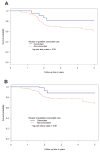Influence of patient, physician, and hospital characteristics on the receipt of guideline-concordant care for inflammatory breast cancer
- PMID: 26605428
- PMCID: PMC4738104
- DOI: 10.1016/j.canep.2015.11.003
Influence of patient, physician, and hospital characteristics on the receipt of guideline-concordant care for inflammatory breast cancer
Abstract
Purpose: Inflammatory breast cancer (IBC) is an aggressive subtype of breast cancer for which treatments vary, so we sought to identify factors that affect the receipt of guideline-concordant care.
Methods: Patients diagnosed with IBC in 2004 were identified from the Breast and Prostate Cancer Data Quality and Patterns of Care Study, containing information from cancer registries in seven states. Variation in guideline-concordant care for IBC, based on National Comprehensive Cancer Network (NCCN) guidelines, was assessed according to patient, physician, and hospital characteristics.
Results: Of the 107 IBC patients in the study without distant metastasis at the time of diagnosis, only 25.8% received treatment concordant with guidelines. Predictors of non-concordance included patient age (≥70 years), non-white race, normal body mass index (BMI 18.5-25 kg/m(2)), patients with physicians graduating from medical school >15 years prior, and smaller hospital size (<200 beds). IBC patients survived longer if they received guideline-concordant treatment based on either 2003 (p=0.06) or 2013 (p=0.06) NCCN guidelines.
Conclusions: Targeting factors associated with receipt of care that is not guideline-concordant may reduce survival disparities in IBC patients. Prompt referral for neoadjuvant chemotherapy and post-operative radiation therapy is also crucial.
Keywords: Breast cancer; Epidemiology; Guideline; Healthcare disparities; Inflammatory breast cancer.
Copyright © 2015 Elsevier Ltd. All rights reserved.
Conflict of interest statement
S.A.S. has stock ownership in Pfizer.
Figures



Similar articles
-
National trends and survival outcomes associated with non-guideline-concordant treatment of inflammatory breast cancer.Breast Cancer Res Treat. 2025 Jun;211(2):527-535. doi: 10.1007/s10549-025-07669-8. Epub 2025 Mar 18. Breast Cancer Res Treat. 2025. PMID: 40100496 Free PMC article.
-
Influence of race, insurance, socioeconomic status, and hospital type on receipt of guideline-concordant adjuvant systemic therapy for locoregional breast cancers.J Clin Oncol. 2012 Jan 10;30(2):142-50. doi: 10.1200/JCO.2011.36.8399. Epub 2011 Dec 5. J Clin Oncol. 2012. PMID: 22147735
-
Using the National Cancer Data Base for quality evaluation to assess adherence to treatment guidelines for nonmetastatic inflammatory breast cancer.Cancer. 2017 Jul 15;123(14):2618-2625. doi: 10.1002/cncr.30660. Epub 2017 Mar 13. Cancer. 2017. PMID: 28295213 Free PMC article.
-
Inflammatory Breast Cancer: What to Know About This Unique, Aggressive Breast Cancer.Surg Clin North Am. 2018 Aug;98(4):787-800. doi: 10.1016/j.suc.2018.03.009. Epub 2018 May 24. Surg Clin North Am. 2018. PMID: 30005774 Review.
-
Inflammatory breast cancer: what we know and what we need to learn.Oncologist. 2012;17(7):891-9. doi: 10.1634/theoncologist.2012-0039. Epub 2012 May 14. Oncologist. 2012. PMID: 22584436 Free PMC article. Review.
Cited by
-
Impact of Guideline-Discordant Treatment on Cost and Health Care Utilization in Older Adults with Early-Stage Breast Cancer.Oncologist. 2019 Jan;24(1):31-37. doi: 10.1634/theoncologist.2018-0076. Epub 2018 Aug 17. Oncologist. 2019. PMID: 30120157 Free PMC article.
-
A meta-analysis of Watson for Oncology in clinical application.Sci Rep. 2021 Mar 11;11(1):5792. doi: 10.1038/s41598-021-84973-5. Sci Rep. 2021. PMID: 33707577 Free PMC article.
-
Applying Artificial Intelligence to Address the Knowledge Gaps in Cancer Care.Oncologist. 2019 Jun;24(6):772-782. doi: 10.1634/theoncologist.2018-0257. Epub 2018 Nov 16. Oncologist. 2019. PMID: 30446581 Free PMC article.
-
Hospital Designations and Their Impact on Guideline-Concordant Care and Survival in Pancreatic Cancer. Do They Matter?Ann Surg Oncol. 2023 Jul;30(7):4377-4387. doi: 10.1245/s10434-023-13308-7. Epub 2023 Mar 25. Ann Surg Oncol. 2023. PMID: 36964844
-
National trends and survival outcomes associated with non-guideline-concordant treatment of inflammatory breast cancer.Breast Cancer Res Treat. 2025 Jun;211(2):527-535. doi: 10.1007/s10549-025-07669-8. Epub 2025 Mar 18. Breast Cancer Res Treat. 2025. PMID: 40100496 Free PMC article.
References
-
- Low JA, Berman AW, Steinberg SM, Danforth DN, Lippman ME, Swain SM. Long-term follow-up for locally advanced and inflammatory breast cancer patients treated with multimodality therapy. J Clin Oncol. 2004;22:4067–4074. - PubMed
-
- Merajver SD, Iniesta MD, Sabel MS. Inflammatory breast cancer. 4. Philadelphia: Lippincott Williams & Wilkins; 2010.
-
- Dawood S, Merajver SD, Viens P, Vermeulen PB, Swain SM, Buchholz TA, Dirix LY, Levine PH, Lucci A, Krishnamurthy S, Robertson FM, Woodward WA, Yang WT, Ueno NT, Cristofanilli M. International expert panel on inflammatory breast cancer: Consensus statement for standardized diagnosis and treatment. Ann Oncol. 2011;22:515–523. - PMC - PubMed
-
- Levine PH, Steinhorn SC, Ries LG, Aron JL. Inflammatory breast cancer: The experience of the surveillance, epidemiology, and end results (seer) program. J Natl Cancer Inst. 1985;74:291–297. - PubMed
Publication types
MeSH terms
Grants and funding
LinkOut - more resources
Full Text Sources
Other Literature Sources
Medical

